The Role of Personal Growth in Leadership
Personal growth and leadership go hand in hand.
Each influencing and enhancing the other.
But why is this so? And how can leaders harness the power of personal growth to become more effective in their roles?
In this blog, we’ll explore these questions and more. We’ll delve into the importance of personal growth in leadership, the key areas to focus on, and practical strategies for fostering personal growth.
So, whether you’re a seasoned leader or just starting on your leadership journey, this blog is for you.
Contents
Why is Personal Growth Important for Leadership?
What Personal Growth Areas are Important in Leadership?
What Personal Growth Strategies Contribute to Good Leadership?
How Does Self-Growth Contribute to Leadership Effectiveness?
How Does Personal Growth Impact Leadership?
What Steps Can Leaders Take to Foster Personal Growth for Themselves?
What Steps Can Leaders Take to Foster Personal Growth for Others?
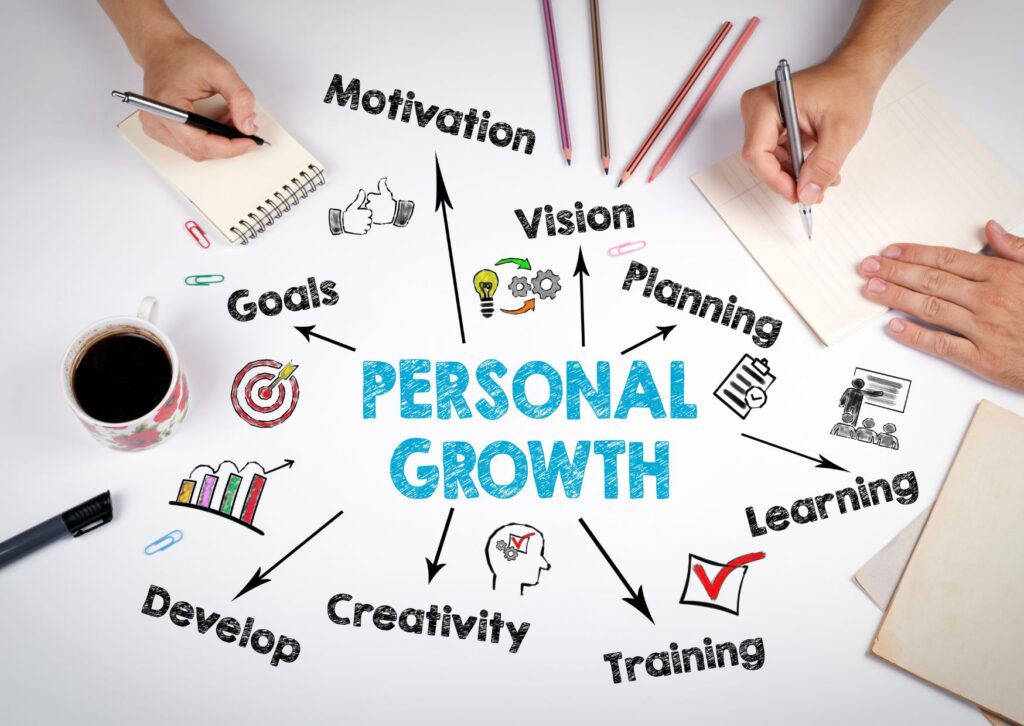
Why is Personal Growth Important for Leadership?
Personal growth is the cornerstone of effective leadership. But why is that?
Think of leadership as a journey.
As a leader, you’re not just responsible for your own journey, but also for guiding others on theirs.
And just like any journey, there will be challenges, detours, and unexpected turns.
Personal growth equips you with the tools to navigate these challenges.
It helps you become more resilient, adaptable, and emotionally intelligent – all crucial traits for a leader.
Moreover, personal growth fosters self-awareness.
It helps you understand your strengths, weaknesses, and values.
This self-knowledge is invaluable in leadership.
It allows you to lead authentically, make informed decisions, and build strong relationships with your team.
In essence, personal growth isn’t just about becoming a better leader.
It’s about becoming a better person. And when you grow as a person, your leadership naturally follows suit.
So, personal growth isn’t just important for leadership – it’s essential!
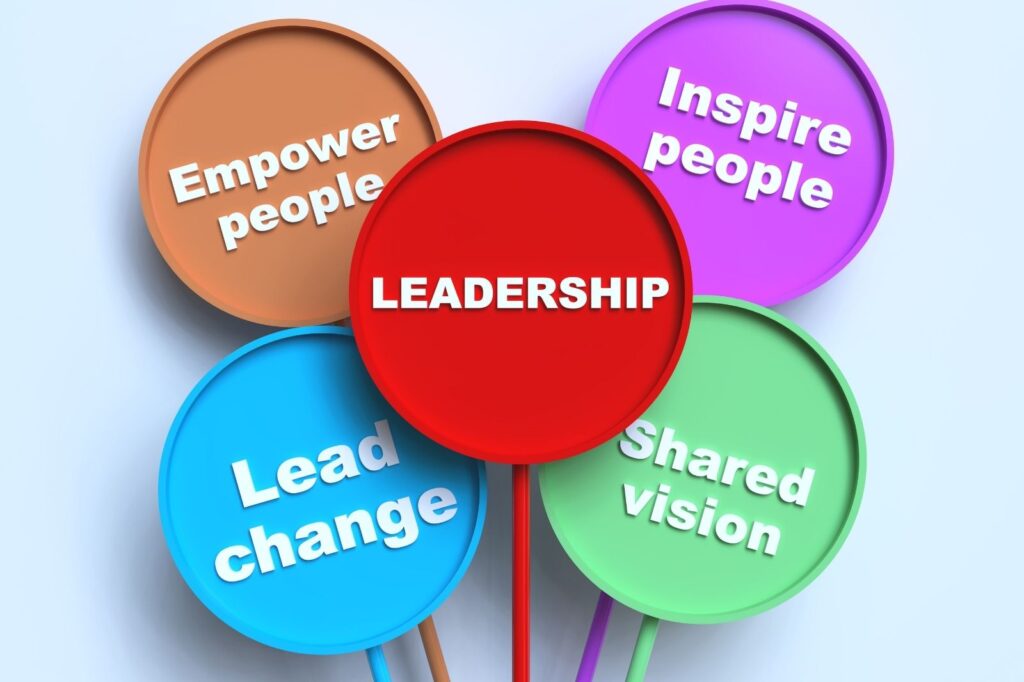
What Personal Growth Areas are Important in Leadership?
When it comes to personal growth in leadership, certain areas stand out as particularly important. Let’s explore these key areas:
1. Self-Awareness
This is all about understanding your emotions, strengths, weaknesses, values, and motivations.
Leaders with high self-awareness can manage their emotions effectively, make informed decisions, and build authentic relationships with their team.
2. Emotional Intelligence
This involves recognising and understanding emotions in yourself and others, and using this awareness to manage your behaviour and relationships.
Emotional intelligence is crucial for leaders as it enhances communication, conflict resolution, and empathy.
3. Resilience
Leadership often involves facing challenges and setbacks.
Resilience is the ability to bounce back from these difficulties and keep going.
It’s about maintaining a positive attitude and staying committed to your goals, even when things get tough.
4. Adaptability
The ability to adapt to change is a key leadership skill.
Leaders need to be flexible and open-minded, ready to adjust their strategies when necessary.
5. Continuous Learning
The best leaders are lifelong learners.
They’re always looking for opportunities to learn and grow, whether that’s through formal education, self-study, or learning from their experiences and mistakes.
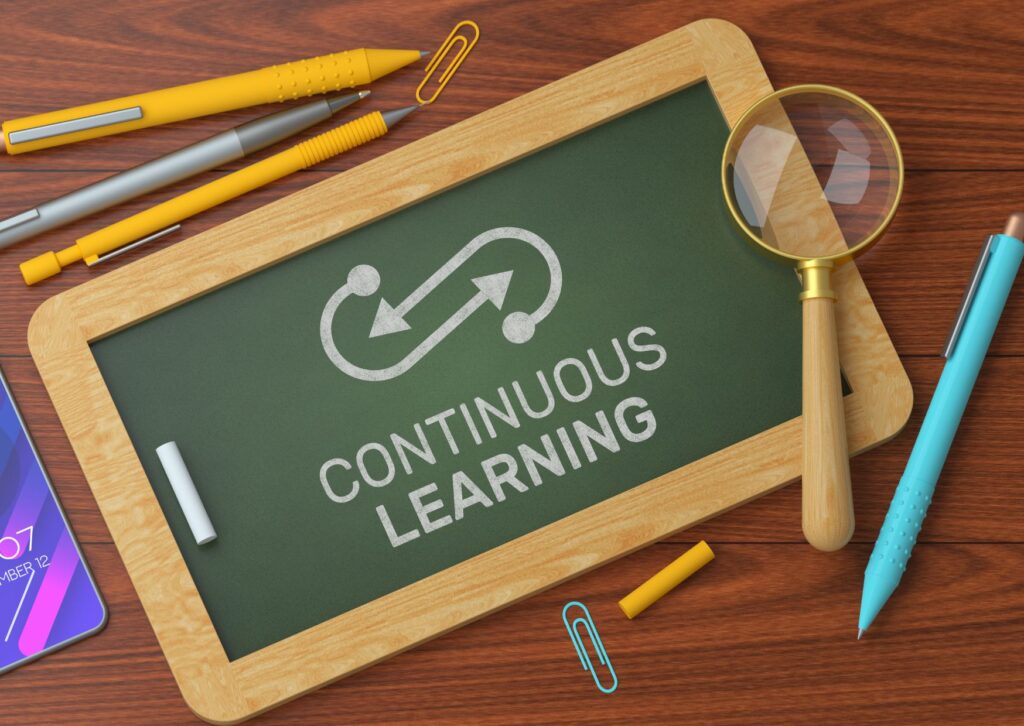
6. Communication Skills
Effective communication is key to leadership.
Leaders need to be able to clearly convey their vision and expectations, listen to their team, and provide constructive feedback.
By focusing on these areas, leaders can enhance their personal growth and become more effective in their roles.
Remember, personal growth is a journey, not a destination. So, keep learning, growing, and evolving as a leader!
What Personal Growth Strategies Contribute to Good Leadership?
Personal growth doesn’t happen by accident.
It requires intention, effort, and the right strategies.
Here are some strategies that can contribute to good leadership:
1. Self-Reflection
Take time to reflect on your experiences, thoughts, and feelings.
This can help you gain insights into your behaviours and reactions, and identify areas for improvement.
2. Feedback
Seek feedback from others.
This can provide valuable perspectives on your strengths and areas for growth.
Remember, feedback is a gift, even when it’s challenging to hear.

3. Continuous Learning
Make learning a lifelong habit.
This could involve reading books, attending workshops, or taking online courses. Stay curious and open to new ideas and perspectives.
4. Mindfulness Practices
Mindfulness can enhance self-awareness and emotional intelligence.
Practices like meditation or mindful breathing can help you stay present and focused, and manage stress effectively.
5. Setting Personal Goals
Set clear, achievable goals for your personal growth.
These could be related to improving specific skills, changing certain behaviors, or achieving certain outcomes.
6. Coaching or Mentoring
Working with a coach or mentor can provide personalised guidance and support on your personal growth journey.
Leaders who work with an executive coach give themselves a sounding board to talk through challenges, work out solutions to problems, and create a clear plan for progress.
Why not check out our blog on “10 Life-Changing Benefits of Executive Coaching“

7. Healthy Habits
Physical health and mental wellbeing are crucial for personal growth.
Regular exercise, a balanced diet, and adequate sleep can boost your energy, mood, and cognitive function.
Why not check out our blog on “4 Steps to Create Life-Changing Habits”
Remember, personal growth is a journey, not a destination. It’s about progress, not perfection.
So, be patient with yourself, celebrate your progress, and keep striving to be the best leader you can be!
How Does Self-Growth Contribute to Leadership Effectiveness?
Self-growth and leadership effectiveness are deeply intertwined.
The journey of self-growth equips leaders with the skills, knowledge, and mindset they need to lead effectively.
But how does this work in practice? Let’s break it down:
1. Enhanced Self-Awareness
Self-growth fosters self-awareness, helping leaders understand their strengths, weaknesses, and values.
This self-knowledge allows leaders to leverage their strengths, work on their weaknesses, and lead authentically.
2. Improved Emotional Intelligence
Self-growth often involves developing emotional intelligence.
This allows leaders to manage their own emotions effectively, empathise with their team members, and navigate interpersonal dynamics with skill and sensitivity.
3. Increased Resilience
Through self-growth, leaders can build resilience.
This enables them to bounce back from setbacks, maintain a positive attitude, and stay committed to their goals, even in the face of adversity.
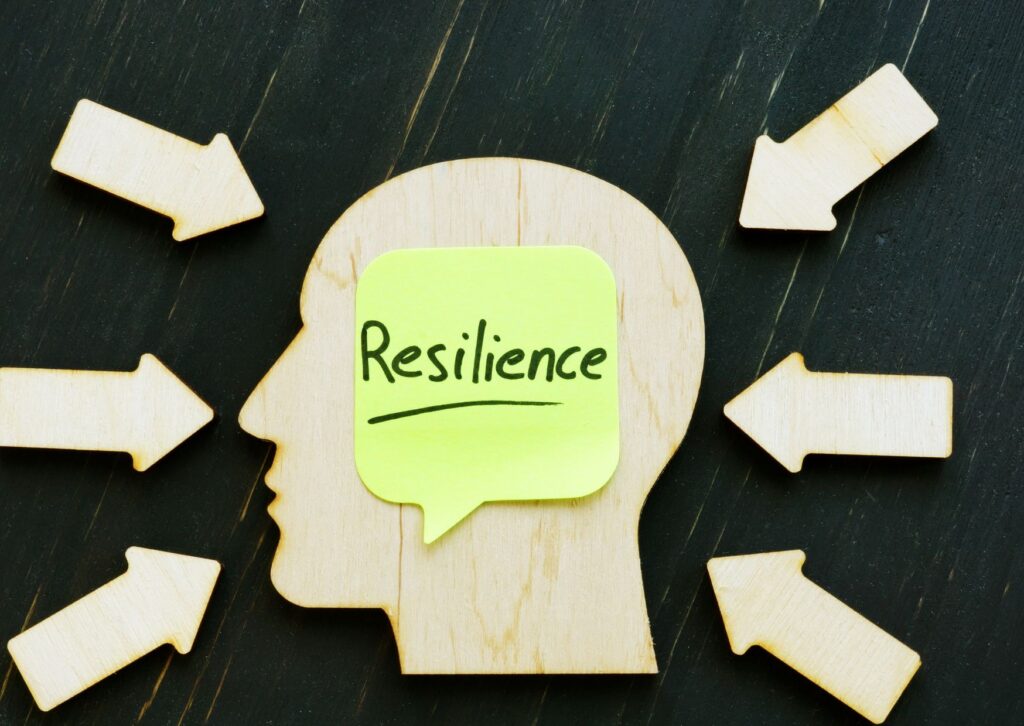
4. Adaptability
Self-growth encourages adaptability.
Leaders who are committed to self-growth are open to new ideas and ready to adjust their strategies when necessary, making them more effective in today’s fast-paced, ever-changing world.
5. Lifelong Learning
Self-growth involves a commitment to continuous learning.
Leaders who are lifelong learners stay up-to-date with the latest trends and developments, and are always looking for ways to improve and innovate.
In essence, self-growth contributes to leadership effectiveness by fostering the skills, attitudes, and behaviours that make a great leader.
It’s a journey that never ends, but one that reaps significant rewards for leaders and their teams.
How Does Personal Growth Impact Leadership?
Personal growth has a profound impact on leadership.
It’s like the secret sauce that can transform good leaders into great ones.
But how exactly does this transformation happen?
1. Improved Decision Making
Personal growth enhances self-awareness and emotional intelligence, leading to more informed and empathetic decision making.
Leaders who understand their own biases and emotions can make decisions that are fair, balanced, and in the best interest of their team.
2. Increased Resilience
Personal growth helps leaders build resilience.
This means they’re better equipped to handle setbacks and challenges, and can guide their team through difficult times with strength and optimism.
3. Enhanced Relationships
Personal growth often involves developing better communication and empathy skills.
This can lead to stronger relationships with team members, fostering a positive and collaborative team culture.

4. Inspiring Others
Leaders who are committed to personal growth often inspire their team members to do the same.
They lead by example, showing others the value of self-improvement and continuous learning.
5. Adaptability
Personal growth promotes adaptability, a crucial trait in today’s fast-paced world.
Leaders who are open to learning and growth can adapt more quickly to change, keeping their team agile and effective.
6. Increased Effectiveness
Ultimately, all these factors contribute to increased leadership effectiveness. Leaders who are committed to personal growth are more self-aware, resilient, adaptable, and inspiring.
They’re better equipped to guide their team towards success, no matter what challenges they face.
So, the impact of personal growth on leadership is clear.
It’s not just about becoming a better leader – it’s about becoming a better person, and that’s a win-win for everyone!

What Steps Can Leaders Take to Foster Personal Growth for Themselves?
As a leader, fostering personal growth isn’t just beneficial—it’s essential.
But where do you start? Here are some steps you can take:
1. Set Clear Goals
Identify what areas you want to grow in.
Do you want to improve your communication skills?
Become more resilient?
Be more adaptable?
Set clear, achievable goals for your personal growth.
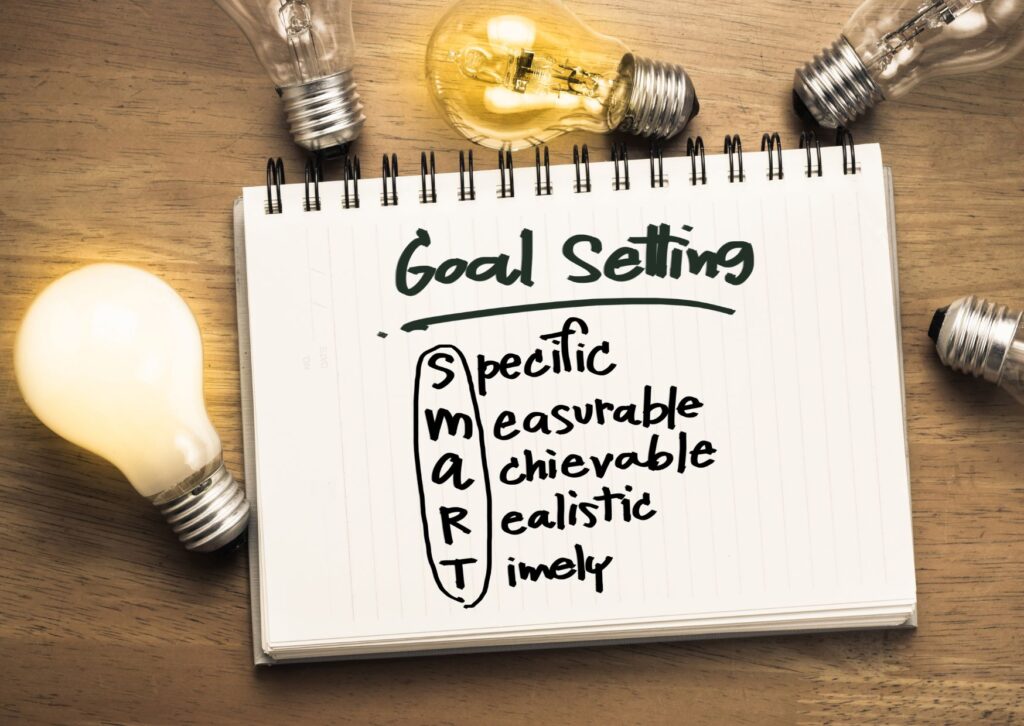
2. Seek Feedback
Feedback is a powerful tool for growth.
Don’t shy away from it—actively seek it.
Ask your team, peers, and superiors for feedback on your leadership style and performance.
3. Invest in Learning
Never stop learning.
Attend workshops, read books, take online courses—whatever works for you. Stay curious and open to new ideas and perspectives.
4. Practice Mindfulness
Mindfulness can enhance self-awareness and emotional intelligence.
Incorporate mindfulness practices, like meditation or mindful breathing, into your daily routine.

5. Find a Mentor or Coach
A mentor or coach can provide personalised guidance and support on your personal growth journey.
They can help you identify areas for improvement, set goals, and stay accountable.
Hiring an Executive coach can help leaders in more ways they can imagine.
6. Reflect Regularly
Regular self-reflection can provide valuable insights into your behaviours, reactions, and emotions.
Take time each day to reflect on your experiences and what you’ve learned.
7. Take Care of Your Health
Physical health and mental wellbeing are crucial for personal growth.
Make sure to eat a balanced diet, exercise regularly, and get enough sleep.
Remember, personal growth is a journey, not a destination.
Be patient with yourself, celebrate your progress, and keep striving to be the best leader you can be!
What Steps Can Leaders Take to Foster Personal Growth for Others?
As a leader, nurturing personal growth in your team members is a vital part of your role.
Here are some steps to help you cultivate a culture of growth:
1. Promote Continuous Learning
Foster a learning environment within your team.
Encourage them to participate in workshops, webinars, or conferences. Provide resources for learning and integrate it into your team’s routine.
2. Support Wellbeing
Personal growth and wellbeing are closely linked.
As a leader, it’s important to support not only your team’s professional development but also their physical and mental health.
This could involve promoting work-life balance, providing wellbeing workshops, webinars, encouraging regular breaks, or providing resources for mental health support.
3. Deliver Constructive Feedback
Regular, constructive feedback can help your team members recognise their strengths and areas for improvement.
Ensure your feedback is specific, balanced, and focuses on behaviour, not the person.
4. Establish Clear Expectations and Goals
Assist your team members in setting personal growth goals that align with their roles and the team’s objectives.
Clear expectations can guide their growth and provide a sense of direction.
5. Provide Necessary Resources
Offer the resources and support your team members need to achieve their personal growth goals.
This could include training, mentoring, or time to pursue learning opportunities.
Providing education on ways employees can “Create Life-Changing Habits” is a great way to help encourage, inspire and motivate them.
6. Lead by Example
Demonstrate your commitment to personal growth by actively pursuing your own learning and development.
Your actions can inspire your team members to follow suit.
7. Cultivate a Safe and Supportive Environment
Create an atmosphere where mistakes are viewed as learning opportunities, not failures.
This encourages team members to take risks, try new things, and learn from their experiences.
8. Acknowledge and Celebrate Growth
Recognise your team members’ growth and achievements.
Employee recognition can boost their motivation and confidence, and spur further growth.
Remember, each person’s growth journey is unique.
Be patient, provide personalised support, and celebrate each individual’s progress.
When your team members grow, your entire team benefits. And that’s a win-win situation for everyone!

We’ve journeyed through the fascinating landscape of personal growth in leadership, exploring its importance, the key areas to focus on, and practical strategies for fostering growth in ourselves and others.
Remember, as leaders, our commitment to personal growth doesn’t just enhance our own leadership—it creates a ripple effect that can inspire growth and wellbeing in our entire team.
So, let’s keep learning, growing, and leading by example.
After all, when we grow as individuals, we elevate our teams, our organisations, and ultimately, the world around us.
Author
Tyler Lowe – Health & Wellbeing Speaker
BSc Sport & Exercise Rehabilitation


